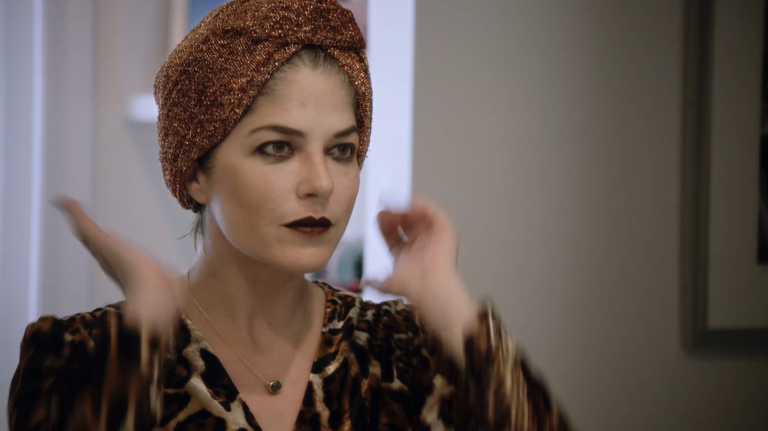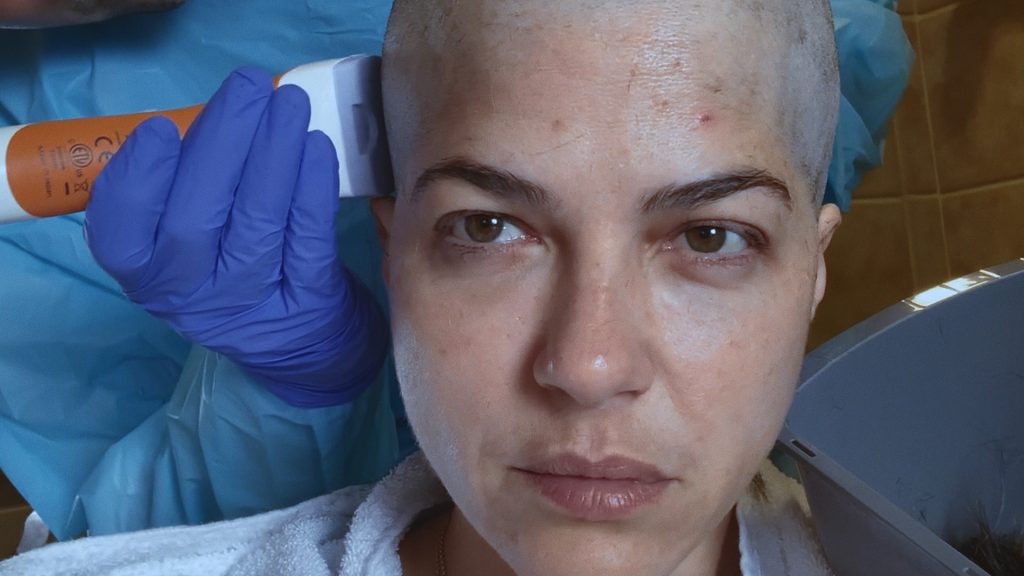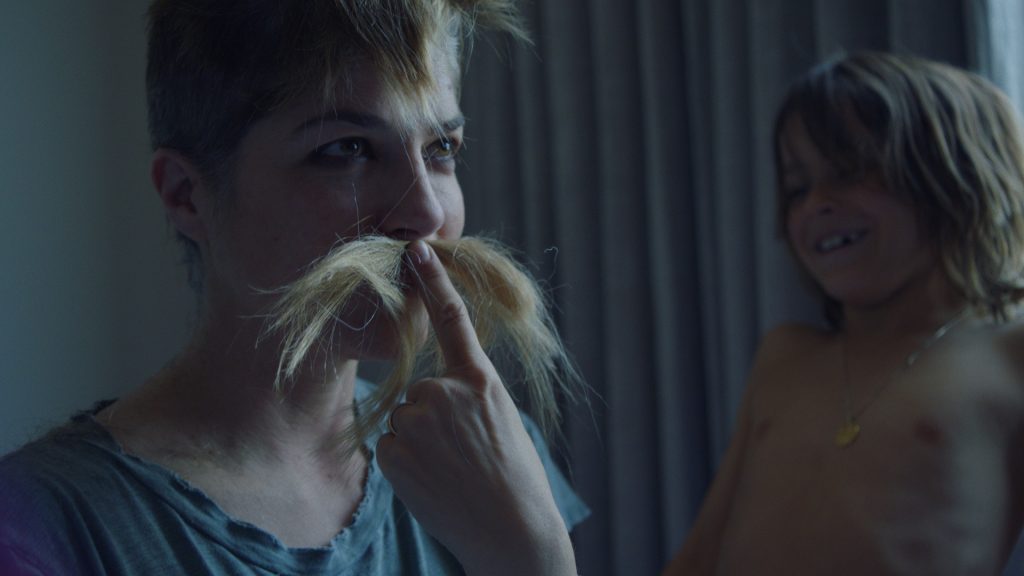
Synopsis : Director Rachel Fleit’s deeply intimate and powerful feature of one woman’s journey of personal acceptance and resilience, Introducing, Selma Blair, follows the singular actress as she reckons with the next chapter of her life after being diagnosed with Multiple Sclerosis. The film explores complex issues ranging from dissecting deep-rooted myths about beauty, and the collective fear around disability and mortality. Complete with her trademark wit and humor, the film follows Blair as she reconciles a journey of monumental transition.
In theaters October 15 and streaming October 21 on discovery+.

An Exclusive Interview with director Rachel Fleit
Q: When did you get involved with this project and at what stage was her Multiple Sclerosis (MS) when you got involved?
Rachel Fleit: I met Selma nine months after she was diagnosed, she had been trying some MS medications, but they weren’t working for her. She learned about the stem cell procedure and it was at that point where she thought, ”Maybe this is something that I should document.” She asked executive producer Cass Bird if she knew anyone who could be trusted with Selma’s private life — she had just worked with Cass on a photo shoot for Vanity Fair.
Cass is a dear friend of mine. So she made the introduction to Selma. Selma and I started talking about the idea of me directing a film about her because the stem cell transplant was happening very soon. We quickly found producers and started filming two months later.
Q: How did you convince her to be in this film? You’re also living with a chronic disease Alopecia, was that an ice breaker?
Rachel Fleit: Selma had a willingness to share her story for sure. It didn’t take much convincing per se. But we did connect almost immediately about our autoimmune diseases. I have alopecia universalis. She has MS; they’re both autoimmune diseases that we have no control over and are quite mysterious. We bonded at first on that, to be honest. Then from there, a trust was really built up.
Q: Though Selma has MS, the symptoms are different for each one who has it. And Selma’s condition could get worse while you’re shooting. What approach did you take on the set?
Rachel Fleit: Selma was staying very close to the hospital. If anything went wrong, we were very nearby. That was the main precaution we took. Other than that, it was just about communication. We took things low key though; we didn’t film for 12 hour days. We did short spurts of filming to give her time to recuperate and not [expend] too much energy.
Q: How did you balance out what to capture and what not to capture in this film — as to where to draw the line?
Rachel Fleit: There was nothing off limits with Selma. She was very much the subject of this film. But she didn’t step foot into our editing [sessions]. She didn’t see the film while it was being edited and didn’t look at anything I filmed. She didn’t try to control the narrative or censor her story in any way, which is extraordinary. As a documentary filmmaker, it’s all about your subject and your access. Selma just opened up her whole life to me. And she trusted me to tell her story. Obviously we showed her the film before we locked picture and she was very happy with it.
She didn’t have any creative notes. She didn’t have things like, “You’ve got to take that out because I don’t look good there.” I knew very quickly into the edit process with my incredible editor Sloan Klevin that she was willing to show this part of herself to the world, and I think we really showed an ordinary [person]who would resonate with people. Because we live in this world where people are constantly putting filters on their faces, her whole being on the screen was transformed in this film. It’s quite powerful for people to see that, and see it unfiltered.

Q: Selma already had a son named Arthur when you started. Did you talk about how Selma told her kid about her disease?
Rachel Fleit: We didn’t include that in the film because I wasn’t there filming when she told him she had multiple sclerosis. My only experience of her with Arthur in terms of her illness is that he very much accepts his mom for how she is, and he lets her be tired or fatigued. On her not-so-well days, he entertains himself. He has a very relaxed attitude about her. At the same time, I think he’s very protective of her. And he’s very aware of her not feeling well, but he goes on with his life. It doesn’t seem to affect him, but I’m sure it does on some level.
I don’t want to speak for Arthur or Selma in that regard, but I experienced the two of them having a very loving and calm relationship. Selma talks about when he goes off to stay with his dad. When she’s about to go to Chicago, she says, “Maybe he’ll have a thought, I wonder if mom’s in bed right now?” But it doesn’t preclude him from having a good day and Selma says this thing, like she broke the cycle of her mother sort of tethering a darkness to her that she wouldn’t do the same with her son. Arthur is full of joy and he’s really fun, just like Selma.
Q: There’s a memorable sequence in the beginning of the film, when Selma is sitting on the red sofa, and starts talking, but she’s having a little bit of speech impediment. You let the cameras keep rolling, as her frustration escalates. It was a bit uncomfortable but you also captured her acceptance of her disease and she’s actually laughing. Could you talk about shooting that sequence?
Rachel Fleit: I think my style, in terms of filmmaking and the verite process of documentary, is to always keep the camera rolling. When we say we’re done, we often don’t turn the record button off. It’s like a trick of the trade. My cinematographer Shane Sigler knew that I told every single person that I work with, just keep the camera rolling for as long as possible. The day that we filmed that scene was one of the best days of filmmaking in my life. We filmed so many important scenes that day. It was June 1st, 2019. I remember it well.
Selma says goodbye to Arthur that day. He’s going to go stay with his dad. She’s about to go to Chicago. They played dodgeball. Then she jumps into the pool with her nightgown on and tells the story of how she stopped drinking. She comes out of the pool, and she changes into her outfit, cause I told her I was going to interview her and she decided, on her own, that she would get dressed up for it. Of course we filmed all of that.
By the time she’d sat in the red chair, it was quite a long day of filming. Her exhaustion caught up with her and she gave me a long interview before her MS symptoms became apparent but we just kept rolling. That’s what we do, cause I want to see life unfold as it is. I think that really encapsulates her exact feeling. It’s like she’s powerless from the MS and it’s very uncomfortable. But then, she has this moment where she laughs, about how she’s dressed and we go on. She then says, “I don’t have anything left” and that’s when we ended the filming that day.
Q: Arthur’s father, Jason, is taking care of him when Selma is having surgery. How much did he help her and make it better for her condition?
Rachel Fleit: She has a very good relationship with Jason, In the film she says they had some contention between them, but they worked things out. Now she knows that he could stay with her and his dad and they could co-parent very well together.
Q: But they’re separated..
Rachel Fleit: They never married, they just share parenting with Arthur.

Q: When she was suggested to have a stem cell transplant, did she have any hesitation doing it? She eventually had to have it because her condition didn’t seem to get any better…
Rachel Fleit: She did have hesitation, but she was going to do it anyway. We interviewed her about this in the film. She said a lot of people told her that she shouldn’t do it, because she could die. But the MS drugs weren’t working. The stem cell transplant was her only option. So she was willing to risk it.
Q: Was there any point while you were shooting that she didn’t want to take the medication because she felt that her body was in a constant battle with itself?
Rachel Fleit: Not that I’ve seen, but I think with a lot of MS medicines you become immune to them. So they stopped working, but that wasn’t my experience with her because my only experience with her was during the stem cell transplant. She was off for all drugs.
Q: What was Selma’s relationship with her mother? Her mother seemed very strict and Selma even mentioned that, “I felt I was never good enough for her.” It was very important to show her relationship with her mother, because, at the same time, she’s also a mother to Arthur.
Rachel Fleit: I can only talk about what I observed. Selma has her own relationship with her mother, but I was really looking to explore her motivation for why she was doing what she was doing. I think there’s this saying, “If it’s not one thing, it’s your mother.” As a storyteller, I was thinking how does this relationship with her mom impact her today? How does this relationship with her mom impact on her relationship with Arthur?
While I was asking those questions, Selma lost her mom during this process. It was very upsetting. She really loved her mom, worshiped her and wanted her approval. Obviously, she talked about this a lot in the film. The loss of her mom was a big loss for her. She could talk more about her relationship; I would say it was a complicated relationship, but she definitely loved her mother.
Q: The film focused on her MS and her relationship with her son. But you did talk about her movie career and such films as “Cruel Intentions?”
Rachel Fleit: I included a sequence about her films, just so that people could understand where Selma landed in the cultural conversation. I felt like this film was less about her being an actress and more about her being a human being and what she was going through as a woman. That’s what makes her so relatable. I really didn’t focus too much on her career.
Q: What do you want audiences to take away from this movie?
Rachel Fleit: I want people to be able to see themselves in Selma’s story and feel how precious, messy and beautiful life is. It’s meant to be enjoyed, even in the hardest of times. I think that’s the takeaway.
Here’s the trailer of the film.

